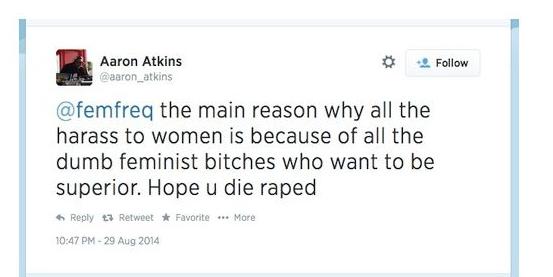What is #GamerGate all about?
A screenshot of one of the harrassing tweets directed at video game critic Anita Sarkeesian.
The phenomenon known as #GamerGate has whipped up a shocking level of rage and vitriol — not to mention profanity — in the tech world.
People identifying themselves using the hashtag #GamerGate have threatened to rape and kill women in the gaming industry — like developer Brianna Wu and game critic Anita Sarkeesian. Sarkeesian recently had to cancel a talk at Utah State University after a threat of a mass shooting. Utah state law prohibits the university from screening the audience for weapons.
So what is this all about?
Adi Robertson, who writes for the technology website The Verge, says #GamerGate has its roots in 2012. That's when Sarkeesian, the creator of the YouTube show Feminist Frequency, launched a Kickstarter campaign for a new YouTube series examining the representation of women in video games.
The success of Sarkeesian’s campaign caused a huge backlash among some members of the gaming community. That backlash, Robertson says, has never really gone away.
But #GamerGate really went crazy online in mid-August, when Eron Gjoni, the ex-boyfriend of an indie game developer named Zoe Quinn, wrote a long post accusing Quinn of cheating on him. One of the people he claimed she had run around with was a reporter at Kotaku, an influential games website.
If the episode sounds like a personal soap opera gone viral, it also blew up because Quinn helped develop a game called Depression Quest. Many #GamerGate people despise it because it's not a game in the traditional sense — that is, it does not involve actual gameplay. But it earned good reviews from gaming media, inflaming fears that political correctness is creeping into video game journalism.
That's how the Quinn-Gjoni incident sparked a range of accusations: cronyism, corruption, collusion and bad ethics in gaming journalism.
Gamers are angry that video game reviews “are not written like Consumer Reports anymore," Robertson says. "They're written like film reviews, and they're not focusing on the graphics or the gameplay. Someone wrote a Grand Theft Auto 5 review and gave it a 9.5 instead of a 10, saying, ‘Yeah, look, this game is kind of sexist,’ and people freaked out and called for her to get fired.”
Robertson says many gamers hate that real-world considerations of politics and sexism are intruding into their fantasy world. “People have written to me," Robertson recalls, "and said, ‘Look, I'm a gamer. I like to play games. I like to not have to be reminded of all this stuff in the real world — like whether there are women. I don’t want to have to be reminded that people think I'm sexist.'"
The situation has gotten ugly, and while the personal attacks have only been electronic and anonymous so far — no physical attacks have happened — the level of threat and intimidation has been palpable. Gamers have also targeted sites they think are covering the issue unfairly, as well at the companies that advertise with them.
Nobody knows how large a number of gamers the #GamerGate people represent, but Robertson believes it is “an incredibly tiny fraction. Even if you're talking about people who tend to call themselves 'hardcore gamers.' I'd still say it's a tiny fraction."
So is this just a passing thing or some irredeemable element in gaming culture? “I think it's arguably more of a terrible [element] of Internet culture,” Robertson says. “This is kind of the final state of a lot of free-floating harassment and anger that's been going around for years."
"It's also a little bit of the dark side of hacktivists groups like Anonymous," she adds. "It's these groups of people [with] a lot of free time who are just really dedicated to bringing something down — whether or not that is, in any way, proportionate.”
This story is based on an interview that aired on PRI's Studio 360 with Kurt Andersen
